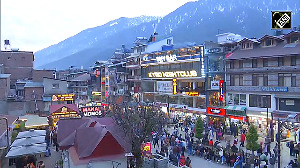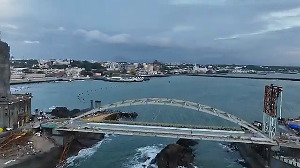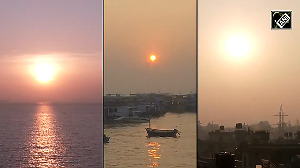Controversial Indian author Arundhati Roy has joined fellow writers in calling for a boycott of a literary festival in Sri Lanka to protest alleged rights abuses and suppression of dissent in the country.
Roy signed up a petition initiated by the Paris-based Reporters without Borders, urging world class authors to stay away from the Galle Literary Festival, which is due to open on January 26.
"We ask you in the great tradition of solidarity that binds writers together everywhere, to stand with your brothers and sisters in Sri Lanka who are not allowed to speak out," the joint appeal said.
It asked the writers to send "a clear message that, unless and until the disappearance of Prageeth Eknaligoda (a local cartoonist who disappeared a year ago) is investigated and there is a real improvement in the climate for free expression in Sri Lanka, you cannot celebrate writing and the arts in Galle."
Roy joined American linguist Noam Chomsky, Ken Loach, Antony Loewenstein, Tariq Ali, R. Cheran and Dave Rampton in issuing the boycott call which was also supported by the Journalists for Democracy, a group of Sri Lankans living in self-imposed exile in Europe.
The joint appeals said that alleged war crimes in the final months of the fighting between Sri Lankan troops and Tamil Tiger rebels was possible because Colombo did not allow free access to independent journalists.
"While mounting evidence of Sri Lanka's war crimes is being shown around the world, journalists inside the country cannot talk about them or even visit the northern areas because they are afraid that they will disappear or be killed," the joint appeal said. It also accused Nobel-winning author Orhan Pamuk and other writers of legitimising repression in Sri Lanka by attending the literary festival.
Dozens of foreign writers, including Turkey's Pamuk, are due in Sri Lanka for the festival which is organised as a private initiative, but has the backing of state enterprises in the country.
"RSF finds it highly disturbing that literature is being celebrated in this manner in a land where cartoonists, journalists, writers and dissident voices are so often victimised by the current government," the group said.
"We believe this is not the right time for prominent international writers like you to give legitimacy to the Sri Lankan government's suppression of free speech," the RSF warned the attending authors.
The organisers of the event said they were stunned by the timing of the RSF call, which is backed by Roy, but noted that no one had pulled out.
A total of 17 journalists and media workers have been killed in Sri Lanka in the past decade, according to rights groups which also said that many local reporters exercise self-censorship to prevent being targeted by the state.







 © 2025 Rediff.com -
© 2025 Rediff.com -